Organisational Behaviour: Case Study Analysis and Report
VerifiedAdded on 2022/12/01
|6
|953
|394
Report
AI Summary
This report provides an analysis of the organisational behaviour of XYZ Training Consultants, a medium-sized company offering management training and leadership development services. The report examines the impact of leadership changes on employee behaviour and turnover. Initially, under the founder Tim Redkin, the company fostered an open management style, equity, and transparency, leading to high employee satisfaction. However, after the handover to Fiona, the report highlights the negative consequences of unequal treatment, loss of transparency, and demotivation among employees. The report focuses on the equity theory of motivation, illustrating how unfair practices led to decreased employee engagement and high turnover rates. It concludes that the company's shift in management practices directly contradicted the principles of equity, resulting in disloyal and disinterested employees. The analysis provides insights into the importance of fair treatment and transparency in maintaining a positive work environment and employee retention.
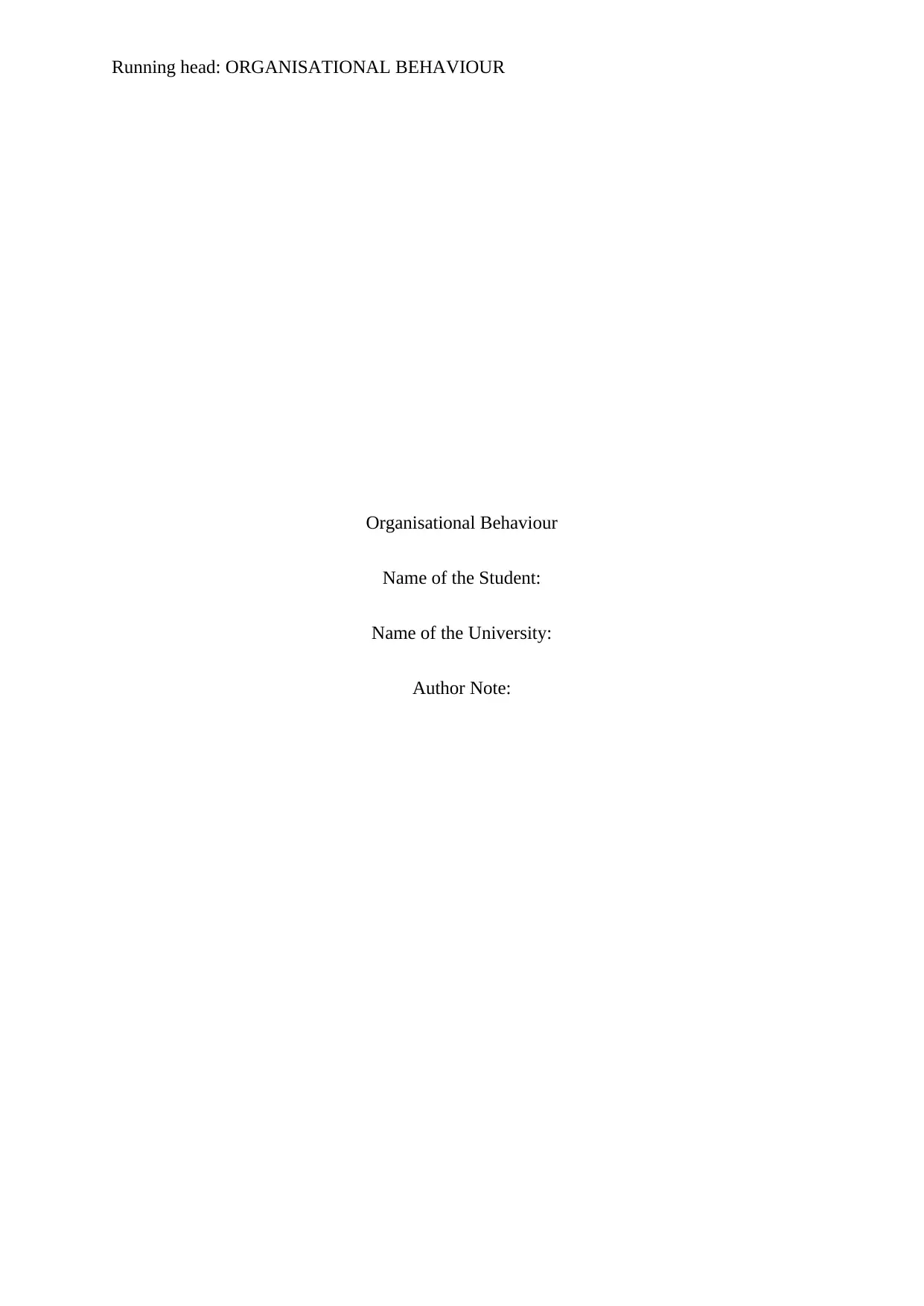
Running head: ORGANISATIONAL BEHAVIOUR
Organisational Behaviour
Name of the Student:
Name of the University:
Author Note:
Organisational Behaviour
Name of the Student:
Name of the University:
Author Note:
Paraphrase This Document
Need a fresh take? Get an instant paraphrase of this document with our AI Paraphraser
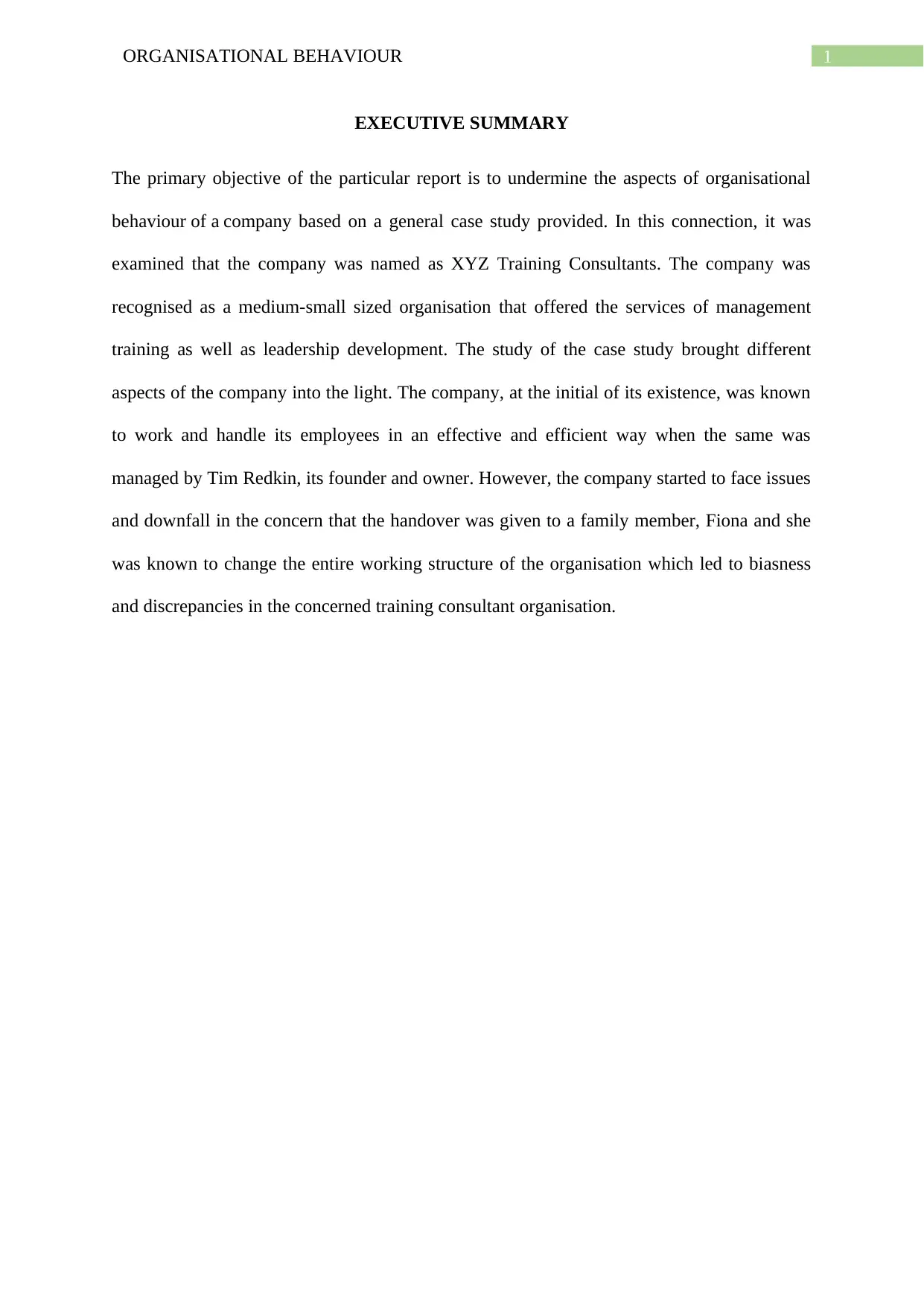
1ORGANISATIONAL BEHAVIOUR
EXECUTIVE SUMMARY
The primary objective of the particular report is to undermine the aspects of organisational
behaviour of a company based on a general case study provided. In this connection, it was
examined that the company was named as XYZ Training Consultants. The company was
recognised as a medium-small sized organisation that offered the services of management
training as well as leadership development. The study of the case study brought different
aspects of the company into the light. The company, at the initial of its existence, was known
to work and handle its employees in an effective and efficient way when the same was
managed by Tim Redkin, its founder and owner. However, the company started to face issues
and downfall in the concern that the handover was given to a family member, Fiona and she
was known to change the entire working structure of the organisation which led to biasness
and discrepancies in the concerned training consultant organisation.
EXECUTIVE SUMMARY
The primary objective of the particular report is to undermine the aspects of organisational
behaviour of a company based on a general case study provided. In this connection, it was
examined that the company was named as XYZ Training Consultants. The company was
recognised as a medium-small sized organisation that offered the services of management
training as well as leadership development. The study of the case study brought different
aspects of the company into the light. The company, at the initial of its existence, was known
to work and handle its employees in an effective and efficient way when the same was
managed by Tim Redkin, its founder and owner. However, the company started to face issues
and downfall in the concern that the handover was given to a family member, Fiona and she
was known to change the entire working structure of the organisation which led to biasness
and discrepancies in the concerned training consultant organisation.
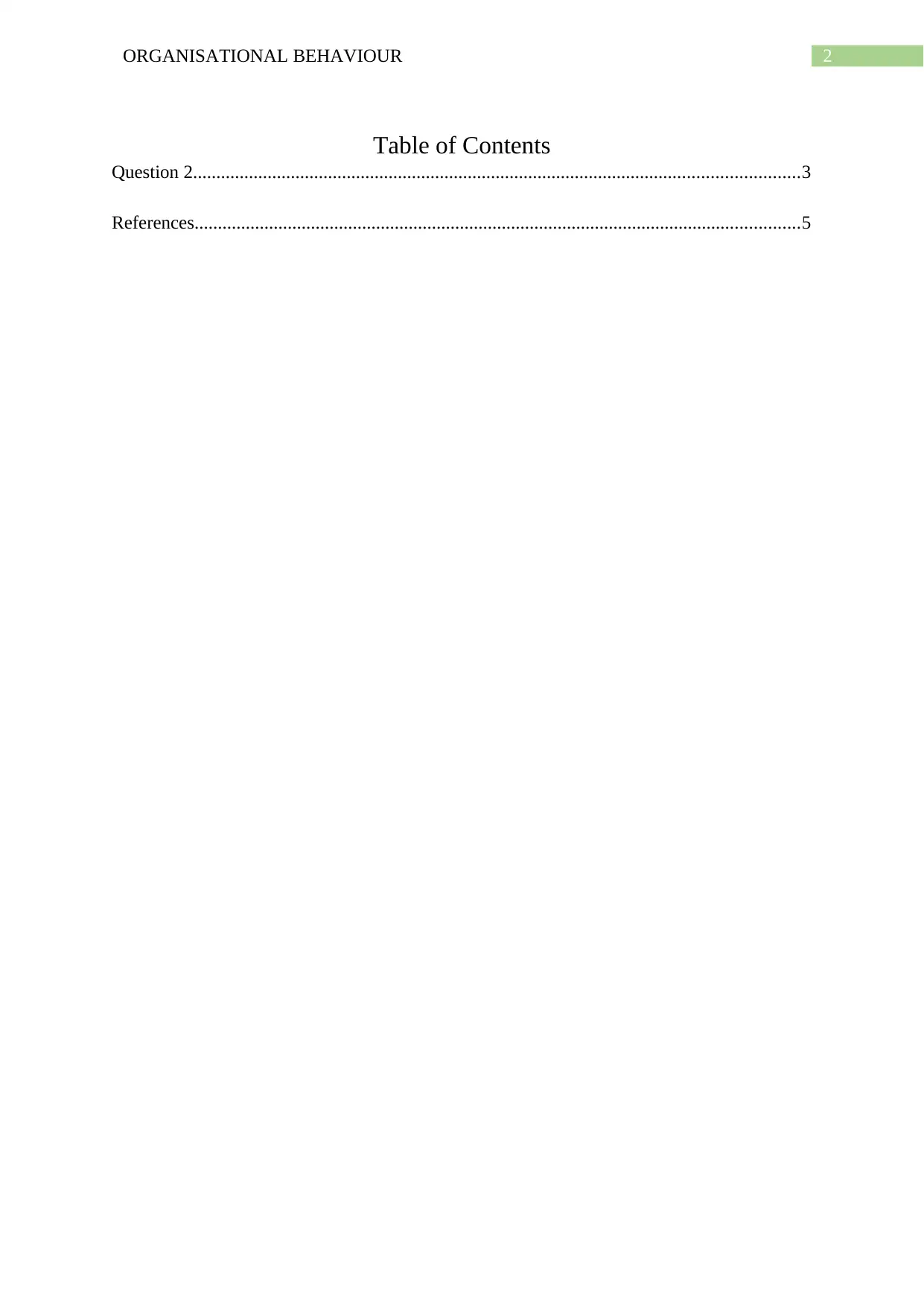
2ORGANISATIONAL BEHAVIOUR
Table of Contents
Question 2..................................................................................................................................3
References..................................................................................................................................5
Table of Contents
Question 2..................................................................................................................................3
References..................................................................................................................................5
⊘ This is a preview!⊘
Do you want full access?
Subscribe today to unlock all pages.

Trusted by 1+ million students worldwide
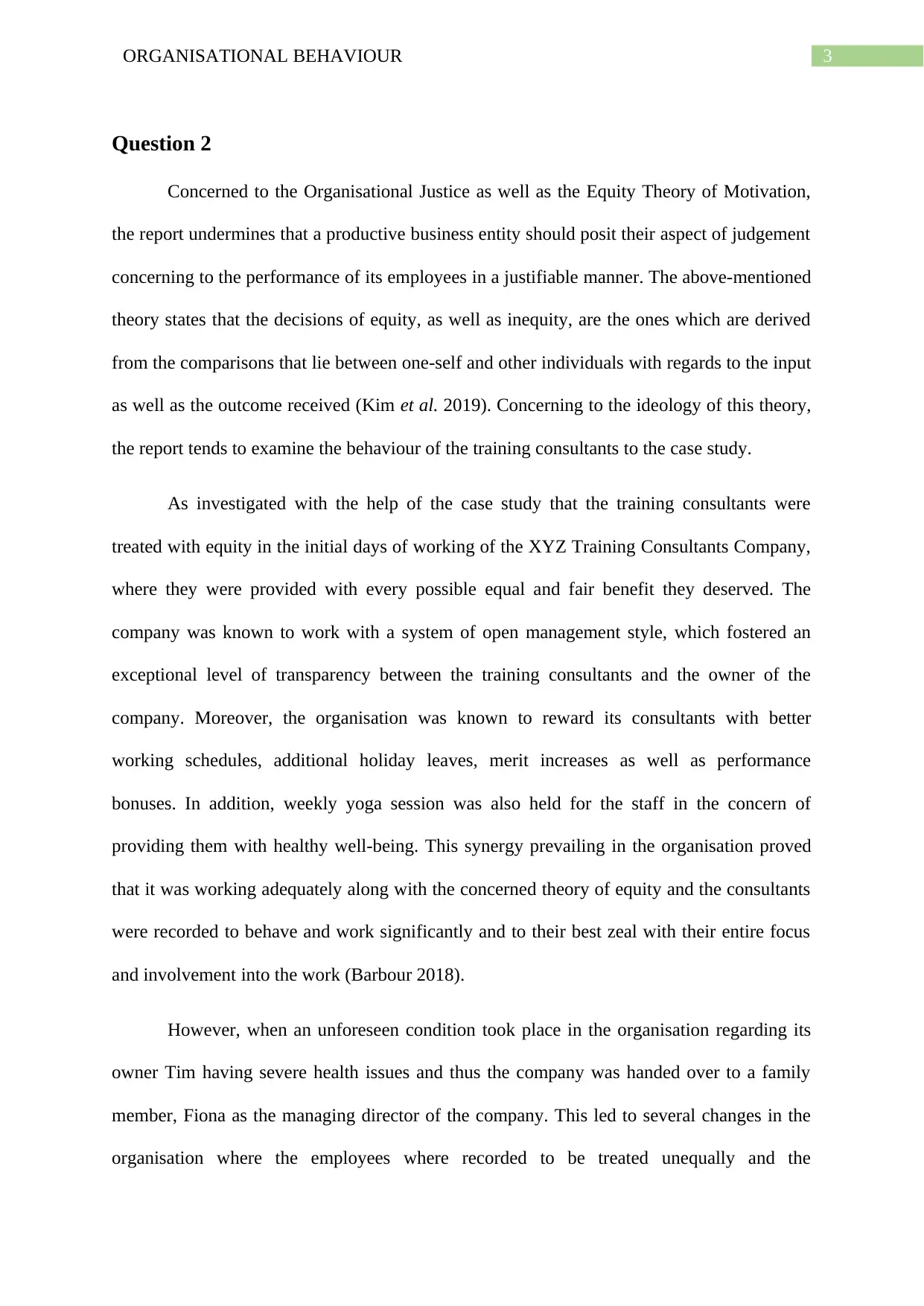
3ORGANISATIONAL BEHAVIOUR
Question 2
Concerned to the Organisational Justice as well as the Equity Theory of Motivation,
the report undermines that a productive business entity should posit their aspect of judgement
concerning to the performance of its employees in a justifiable manner. The above-mentioned
theory states that the decisions of equity, as well as inequity, are the ones which are derived
from the comparisons that lie between one-self and other individuals with regards to the input
as well as the outcome received (Kim et al. 2019). Concerning to the ideology of this theory,
the report tends to examine the behaviour of the training consultants to the case study.
As investigated with the help of the case study that the training consultants were
treated with equity in the initial days of working of the XYZ Training Consultants Company,
where they were provided with every possible equal and fair benefit they deserved. The
company was known to work with a system of open management style, which fostered an
exceptional level of transparency between the training consultants and the owner of the
company. Moreover, the organisation was known to reward its consultants with better
working schedules, additional holiday leaves, merit increases as well as performance
bonuses. In addition, weekly yoga session was also held for the staff in the concern of
providing them with healthy well-being. This synergy prevailing in the organisation proved
that it was working adequately along with the concerned theory of equity and the consultants
were recorded to behave and work significantly and to their best zeal with their entire focus
and involvement into the work (Barbour 2018).
However, when an unforeseen condition took place in the organisation regarding its
owner Tim having severe health issues and thus the company was handed over to a family
member, Fiona as the managing director of the company. This led to several changes in the
organisation where the employees where recorded to be treated unequally and the
Question 2
Concerned to the Organisational Justice as well as the Equity Theory of Motivation,
the report undermines that a productive business entity should posit their aspect of judgement
concerning to the performance of its employees in a justifiable manner. The above-mentioned
theory states that the decisions of equity, as well as inequity, are the ones which are derived
from the comparisons that lie between one-self and other individuals with regards to the input
as well as the outcome received (Kim et al. 2019). Concerning to the ideology of this theory,
the report tends to examine the behaviour of the training consultants to the case study.
As investigated with the help of the case study that the training consultants were
treated with equity in the initial days of working of the XYZ Training Consultants Company,
where they were provided with every possible equal and fair benefit they deserved. The
company was known to work with a system of open management style, which fostered an
exceptional level of transparency between the training consultants and the owner of the
company. Moreover, the organisation was known to reward its consultants with better
working schedules, additional holiday leaves, merit increases as well as performance
bonuses. In addition, weekly yoga session was also held for the staff in the concern of
providing them with healthy well-being. This synergy prevailing in the organisation proved
that it was working adequately along with the concerned theory of equity and the consultants
were recorded to behave and work significantly and to their best zeal with their entire focus
and involvement into the work (Barbour 2018).
However, when an unforeseen condition took place in the organisation regarding its
owner Tim having severe health issues and thus the company was handed over to a family
member, Fiona as the managing director of the company. This led to several changes in the
organisation where the employees where recorded to be treated unequally and the
Paraphrase This Document
Need a fresh take? Get an instant paraphrase of this document with our AI Paraphraser
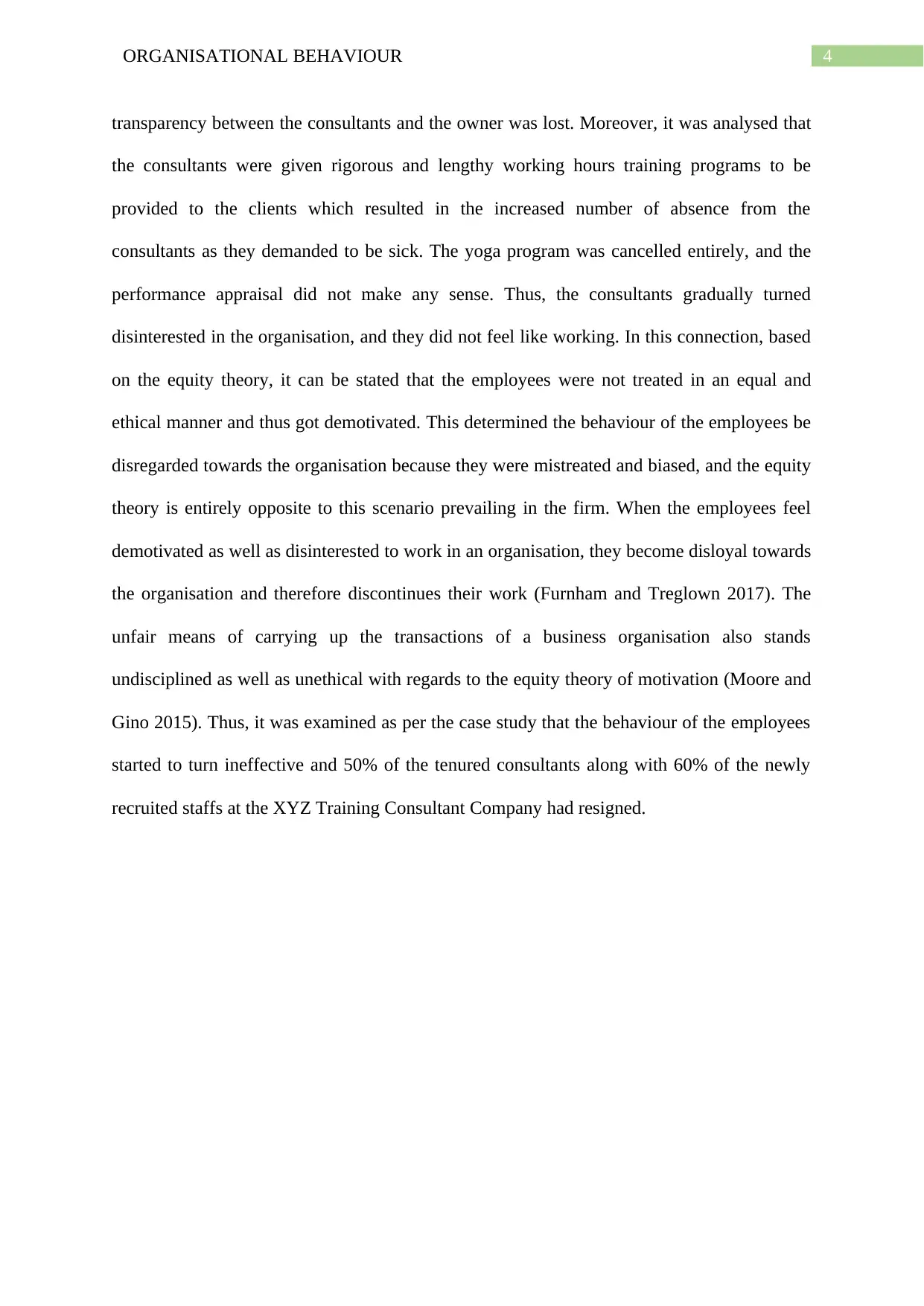
4ORGANISATIONAL BEHAVIOUR
transparency between the consultants and the owner was lost. Moreover, it was analysed that
the consultants were given rigorous and lengthy working hours training programs to be
provided to the clients which resulted in the increased number of absence from the
consultants as they demanded to be sick. The yoga program was cancelled entirely, and the
performance appraisal did not make any sense. Thus, the consultants gradually turned
disinterested in the organisation, and they did not feel like working. In this connection, based
on the equity theory, it can be stated that the employees were not treated in an equal and
ethical manner and thus got demotivated. This determined the behaviour of the employees be
disregarded towards the organisation because they were mistreated and biased, and the equity
theory is entirely opposite to this scenario prevailing in the firm. When the employees feel
demotivated as well as disinterested to work in an organisation, they become disloyal towards
the organisation and therefore discontinues their work (Furnham and Treglown 2017). The
unfair means of carrying up the transactions of a business organisation also stands
undisciplined as well as unethical with regards to the equity theory of motivation (Moore and
Gino 2015). Thus, it was examined as per the case study that the behaviour of the employees
started to turn ineffective and 50% of the tenured consultants along with 60% of the newly
recruited staffs at the XYZ Training Consultant Company had resigned.
transparency between the consultants and the owner was lost. Moreover, it was analysed that
the consultants were given rigorous and lengthy working hours training programs to be
provided to the clients which resulted in the increased number of absence from the
consultants as they demanded to be sick. The yoga program was cancelled entirely, and the
performance appraisal did not make any sense. Thus, the consultants gradually turned
disinterested in the organisation, and they did not feel like working. In this connection, based
on the equity theory, it can be stated that the employees were not treated in an equal and
ethical manner and thus got demotivated. This determined the behaviour of the employees be
disregarded towards the organisation because they were mistreated and biased, and the equity
theory is entirely opposite to this scenario prevailing in the firm. When the employees feel
demotivated as well as disinterested to work in an organisation, they become disloyal towards
the organisation and therefore discontinues their work (Furnham and Treglown 2017). The
unfair means of carrying up the transactions of a business organisation also stands
undisciplined as well as unethical with regards to the equity theory of motivation (Moore and
Gino 2015). Thus, it was examined as per the case study that the behaviour of the employees
started to turn ineffective and 50% of the tenured consultants along with 60% of the newly
recruited staffs at the XYZ Training Consultant Company had resigned.
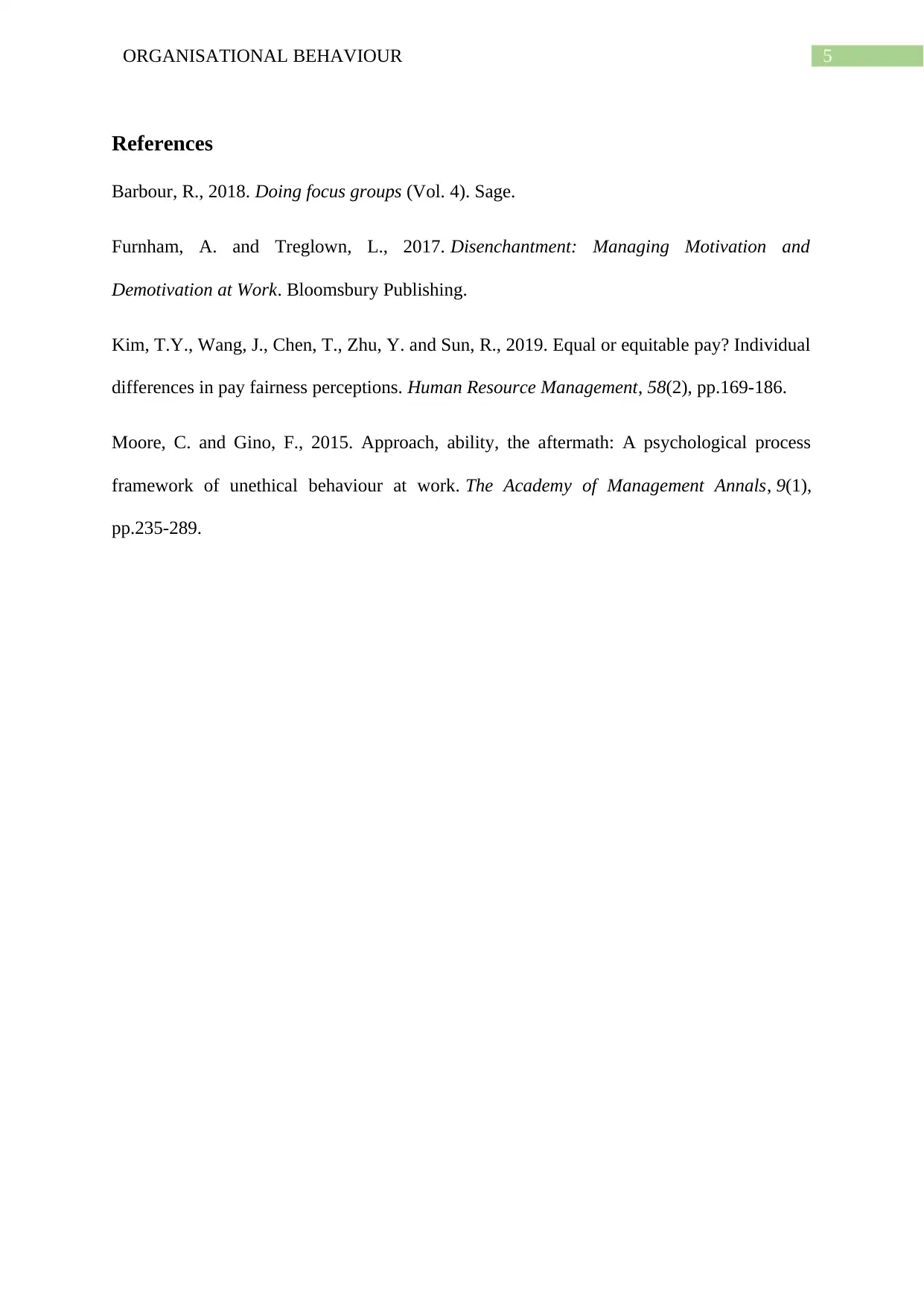
5ORGANISATIONAL BEHAVIOUR
References
Barbour, R., 2018. Doing focus groups (Vol. 4). Sage.
Furnham, A. and Treglown, L., 2017. Disenchantment: Managing Motivation and
Demotivation at Work. Bloomsbury Publishing.
Kim, T.Y., Wang, J., Chen, T., Zhu, Y. and Sun, R., 2019. Equal or equitable pay? Individual
differences in pay fairness perceptions. Human Resource Management, 58(2), pp.169-186.
Moore, C. and Gino, F., 2015. Approach, ability, the aftermath: A psychological process
framework of unethical behaviour at work. The Academy of Management Annals, 9(1),
pp.235-289.
References
Barbour, R., 2018. Doing focus groups (Vol. 4). Sage.
Furnham, A. and Treglown, L., 2017. Disenchantment: Managing Motivation and
Demotivation at Work. Bloomsbury Publishing.
Kim, T.Y., Wang, J., Chen, T., Zhu, Y. and Sun, R., 2019. Equal or equitable pay? Individual
differences in pay fairness perceptions. Human Resource Management, 58(2), pp.169-186.
Moore, C. and Gino, F., 2015. Approach, ability, the aftermath: A psychological process
framework of unethical behaviour at work. The Academy of Management Annals, 9(1),
pp.235-289.
⊘ This is a preview!⊘
Do you want full access?
Subscribe today to unlock all pages.

Trusted by 1+ million students worldwide
1 out of 6
Related Documents
Your All-in-One AI-Powered Toolkit for Academic Success.
+13062052269
info@desklib.com
Available 24*7 on WhatsApp / Email
![[object Object]](/_next/static/media/star-bottom.7253800d.svg)
Unlock your academic potential
Copyright © 2020–2026 A2Z Services. All Rights Reserved. Developed and managed by ZUCOL.





